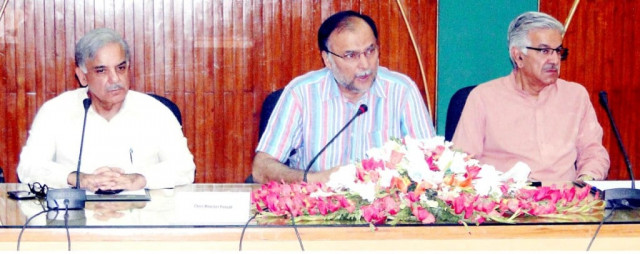Pakistan’s energy woes: Foreign helpers take a dim view of piling circular debt
Chinese power producers express reservations about non-resolution of issue.

As Pakistan is set to enter into 25-year power purchase agreements with Chinese companies, foreign power producers have expressed reservations over the existing mechanisms that led to piling up of over Rs300 billion of circular debt.
During recent meetings with Pakistani authorities, Chinese investors showed their reservations over non-resolution of circular debt, according to the Ministry of Planning and Development officials. The issue of payment modalities of power purchase agreements also came up for discussion during a meeting of Steering Committee on Energy Projects under China-Pakistan Economic Corridor (CPEC).
The meeting was chaired by Minister for Planning and Development Ahsan Iqbal and attended by Punjab Chief Minister Shahbaz Sharif, Federal Minister for Water and Power Khwaja Asif and Secretary Planning Hasan Nawaz Tarar.
The high level huddle decided to call Secretary Finance Dr Waqar Masood in the next meeting to get the views of the finance ministry that is reluctant to acknowledge over Rs300 billion circular debt in its books.
Due to the ministry’s dilly-dallying over payments to the Independent Power Producers, almost all the producers have already sent notices to the federal government, warning to call the sovereign guarantees if it did not clear the outstanding dues.
The official told The Express Tribune that Pakistan and China will sign Power Purchase Agreements on August 4 in Beijing. They added the agreements will be for 25 years. The government will give an upfront tariff to the power producers and the producers will be responsible for engineering, procurement and construction activities.
The officials said in order to allay Chinese investors’ concerns the government was also formulating special rules and regulations aimed at finding a way to avoid application of Public Procurement Regulatory Authority (PPRA) rules on these contracts.
The PPRA rules are aimed at ensuring transparency in public contracts but often become hurdle in speedy implementation of agreements.
The steering committee on energy has been constituted by Prime Minister Nawaz Sharif after he found that the activities of various ministries were not synchronised which could delay the implementation of energy projects initiated under the Pak-China corridor.
The steering committee will regularly review progress and find ways to remove obstacles that may hinder work on critical projects like integrated plan for generation, transmission and distribution and an integrated plan for transportation of coal across the country. The problem of an obsolete transmission infrastructure became severe during the past few days, leading to long hours of load- shedding across the country.
The steering committee will be dealing with a seven-point agenda that includes to review feasibility studies of energy projects under CPEC; demand and supply framework of ongoing and new projects, integrated plan for generation, transmission and distribution; payment modalities of power purchase agreements; curtailing power losses, integrated coal logistics plan for coal power projects and more importantly the Chinese investors concerns regarding security and PPRA rules.
Iqbal said that CPEC was a key initiative which will help Pakistan in meeting the energy shortfall. “China is keen on pursuing the projects initiated under the corridor,” he said, “the government has to deliver results according to strict timelines and work on full capacity to avail this historic window of opportunity.”
Iqbal stated that during his recent visit to China the delegation sensitised Chinese authorities to prioritise Pakistan’s energy projects, according to a handout issued by the Ministry of Planning.
Under the corridor, the government plans to install 66,00 megawatt projects at the Gaddani Energy Park, the Quaid-i-Azam Solar Power Park in Punjab, the Karachi-Lahore Railways Project (ML-I) and coal-based power projects at Port Qasim.
Iqbal stressed on the integration of work to bring about synergy. He called for an integrated plan for coal logistics for energy projects and also directed the committee to address observations of Chinese authorities.
“Generation of electricity is not the only issue but the transmission and distribution mechanisms are becoming major irritants.”
Iqbal also constituted a working group to address the issues related to the transportation of coal from Sindh to Punjab.
Published in The Express Tribune, July 13th, 2014.
Like Business on Facebook, follow @TribuneBiz on Twitter to stay informed and join in the conversation.



















COMMENTS
Comments are moderated and generally will be posted if they are on-topic and not abusive.
For more information, please see our Comments FAQ